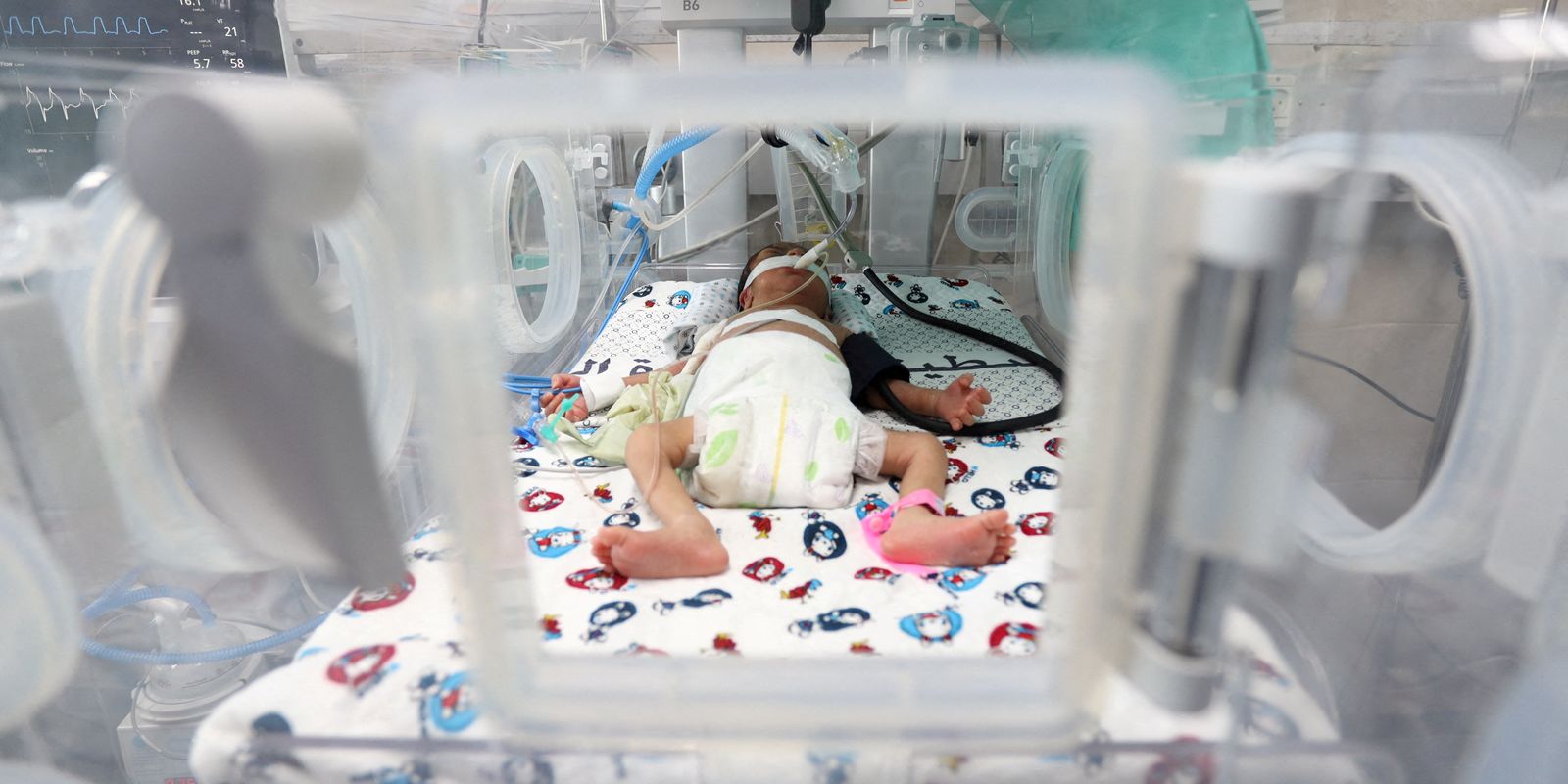The famous “nine months” of pregnancy, in fact, simplify a much more complex calculation: human pregnancy takes around 40 weeks, but is considered “full term”, that is, within the appropriate time, from 37 to 42. However, in 2023, almost 12% of births in Brazil took place before this milestone, totaling around 300 thousand premature babies, with lesser or greater risks of health problems, depending on the time they spent in the pregnant woman’s womb. Brazil is not only above the global average, which is around 10%, but it is also one of the ten countries with the highest number of premature births per year.
According to the executive director of the Brazilian Association of Parents, Family, Friends and Caregivers of Premature Babies, Denise Suguitani, most of these cases can be prevented: “Here in Brazil these rates are closely linked to social determinants, access to healthcare and education. Pregnancy in adolescence, for example, is already a risk factor for premature birth because the girl’s body is not prepared for pregnancy. is smaller, so family planning is very important. And, of course, access to prenatal care is not just the volume of consultations that matters, but the quality of care and information.”
Obstetrician Joeline Cerqueira, who is part of the Prenatal Care Committee of the Brazilian Federation of Gynecology and Obstetrics Associations (Febrasgo), lists some situations that can be identified in prenatal care and treated to avoid premature birth, among other complications: “We have infections, premature water rupture and hypertensive syndromes during pregnancy. These diseases affect many women during pregnancy and are some of the main causes of premature birth.”
The specialist explains that it is necessary for pregnant women to start prenatal care early, be well evaluated to identify pre-existing risk factors, and undergo all recommended tests at the right time. “When the pregnant woman undergoes the morphological ultrasound, we also measure the cervix. If it is too short, this woman has a greater risk, even without any other disease, of having a premature birth. And the We can use, for example, progesterone vaginally, which is a muscle relaxant and prevents contractions from occurring too early. This test needs to be done around the 22nd week of pregnancy”, explains Joeline.
Main causes
Premature water rupture is more common in pregnant adolescents or older women, people with uterine malformations, those who are poorly nourished and those who drink alcohol, smoke or use other drugs during pregnancy. The risk is also greater in pregnancies with more than one baby, and when the placenta is poorly inserted into the uterus. Even in situations where the cause cannot be reversed, the pregnant woman can be monitored more frequently and even admitted to a hospital, and receive medication to accelerate the maturity of the baby’s organs and try to prolong the pregnancy as much as possible.
Bacterial infections, especially urinary infections, and sexually transmitted infections, are also major causes of prematurity. Sexually transmitted infections can be detected in laboratory tests and prevented with safe sex, while urinary infections are quite common during pregnancy and do not always have symptoms during this period. But unusual abdominal discomfort or a sudden increase in the urge to urinate can be warning signs, and if the disease is treated with antibiotics, premature birth can be avoided.
Hypertension is the main factor in pregnancy complications, and in addition to causing premature births, it is the biggest cause of maternal and perinatal death in Brazil. It is estimated that 15% of pregnant women have high blood pressure during pregnancy and that a quarter of premature births occur for this reason. Therefore, measuring blood pressure is one of the basic procedures of prenatal consultations, reinforces the Febrasgo specialist: “The best prevention is primary, that is, detecting the potential for that woman to have severe hypertension in pregnancy and already take prophylaxis with AAS, which is a very cheap medicine, and calcium. But even when you detect that the pressure has started to rise, if you start treating it, this actually prevents up to 80% of cases of bad outcomes”.
The executive director of the Brazilian Association of Parents, Families, Friends and Caregivers of Premature Babies, Denise Suguitani, states that the large number of cesarean sections in Brazil also contributes to this scenario. According to data from the Ministry of Health, in 2023, almost 60% of births occurred via surgery.
“We have many elective cesarean sections, which is a cesarean section scheduled without necessarily a medical indication. This brings more premature babies because pregnancy is not an exact mathematics. Today the Federal Council of Medicine authorizes scheduling without medical indication only from 39 weeks, but often when the doctor schedules a cesarean section at 39 weeks, due to the woman’s misinformation or some error in the calculation, the baby may be less than 37. And he is an immature baby. He needs to go to an ICU immediately, but when he goes to breastfeed he gets confused, he has difficulty breathing.” adds Denise.
Consequences
Generally, a fetus is considered viable – that is, capable of living outside the uterus – from 25 weeks onwards, and with a minimum weight of 500 grams. But the mortality rate after birth among these extremely premature babies is 30% to 45%, and less than half of survivors develop without disabilities or health problems. With each week of gestation, the survival rate increases and the probability of sequelae decreases, but even babies born days before the ideal period have an increased risk of mild cerebral palsy and developmental delays.
Yngrid Antunes Louzada had an early birth due to a urinary infection and her twin children, Lucas and Isis, were born at just 27 weeks of gestation, weighing less than 1 kilo and measuring 33 and 35 centimeters. The family received a frightening warning from doctors: the children were at high risk of psychomotor delays and breathing problems, and the hospitalization itself posed a risk of infections. There were 52 days of intensive care for the little ones and anxiety for Yngrid and her husband, Felipe:
“We stayed in the NICU (neonatal intensive care unit) two hours a day, seven days a week. Every day I arrived a little early to be able to express milk for them. Everything was well organized, the children stayed in the incubator and My husband and I shared each other, each with a child. We always kept an eye on every little noise, on the monitor, on the saturation. It was the end of the Covid-19 pandemic, so we had to be very careful, the ones. parents needed to use a special outfit, with a mask”
And it wasn’t easy at all when the two-hour visit ended: “Not having our children at home was sad for us, right? Because we hadn’t idealized that, even though they were very well supported and cared for. After three weeks of hospitalization, they allowed the kangaroo method, and it was a very special, very emotional moment. Because, there, I was able to have the first physical contact with my children.”
After 52 days, Lucas and Isis were discharged and the best part: they went home without any consequences. They needed physical therapy, occupational therapy and speech therapy for almost 2 and a half years, but now they have the routine of any healthy child. “They were born at the Navy hospital and when they were discharged, they were referred for therapy, because the Navy’s health system has a specific place for treating premature babies. This assistance made a big difference,” says Yngrid.
Denise Suguitani, executive director of the Brazilian Association of Parents, Family, Friends and Caregivers of Premature Babies reinforces this point: even premature babies who leave the hospital healthy need monitoring. “Prematurity is not a sentence: each baby writes its own story. But the risk is great, so we need to look with a magnifying glass because these children need special attention from several professionals: occupational therapist, physiotherapist, speech therapist, various specialties doctors, nutritionists to look at this baby who has a peculiar development. These specialists can identify a risk and intervene early”, he adds.
“The impact of prematurity is so great that the father often abandons the baby or there ends up being a family separation and the mother is left alone. And if it is a child who requires a lot of consultations, therapies, how is this mother? So social assistance stops this family is also important”, adds Denise.















